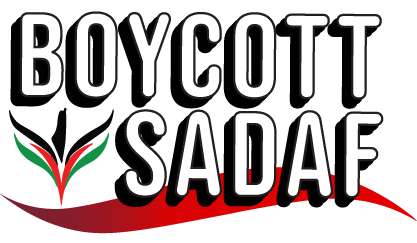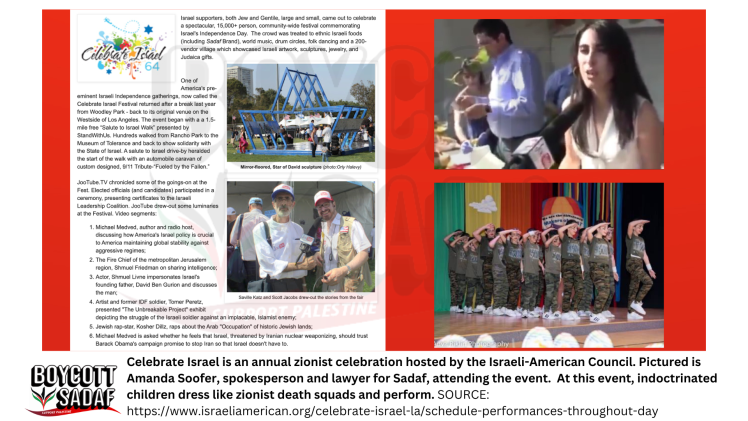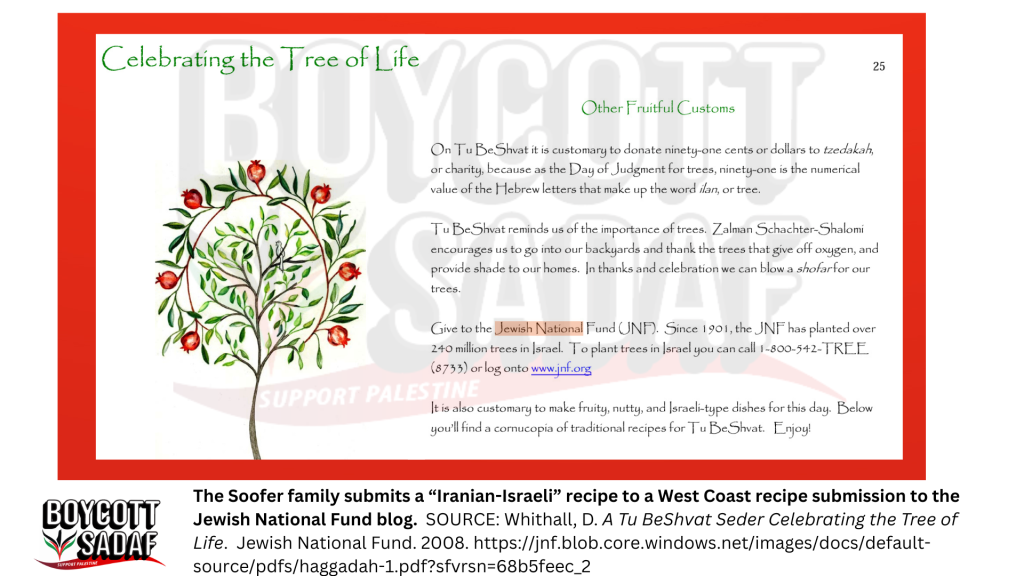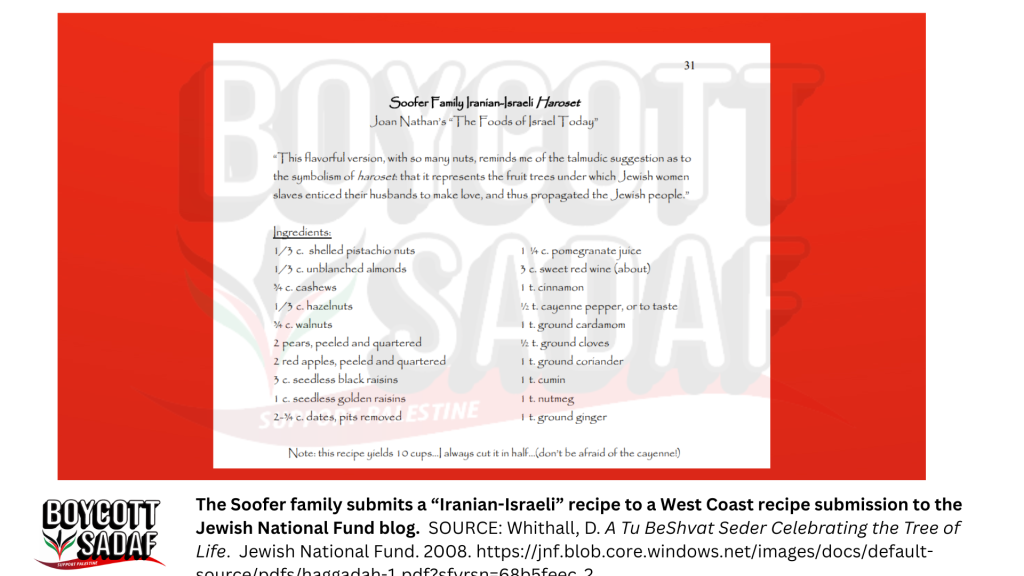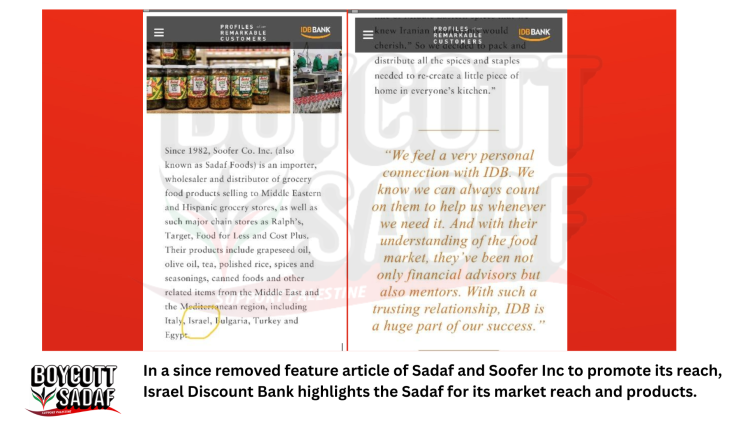It is our duty to uphold the thawabet and a principled line against normalization. We must boycott Sadaf and all companies that aid the zionist project. They perpetuate the Nakba and harm our people on the ground who safeguard our homeland and our agricultural way of life. We must ensure that our community is supporting the industries of our people to safeguard our self sustainability and dignity.
The following research demonstrates how Sadaf promotes normalization across these various tactics. We must boycott Sadaf and all companies that aid the zionist project, because they perpetuate the Nakba and harm our people in Palestine. Our people, under occupation and in the camps throughout Palestine and in the region, safeguard our homeland and our agricultural way of life. We must ensure that we are supporting our own industries, to promote our own self-sustainability, way of life, and dignity.
Based in Los Angeles, the food items company was founded in 1982 by Soofer Co., Inc., a family-run company that began a new life after fleeing Iran when the CIA-backed Shah was overthrown. It began its operations in Southern California, where Armenian and Arab immigrants and refugees reside, using them as an entry point into the market. It operates both in the U.S. and in Occupied Palestine, maintaining heavy business relationships with the zionist entity.
- Incentivized Trade to Promote Normalization
- Sadaf is directly implicated with IOF & US military
- Sadaf sources 70% of its goods from “israeli” settlers
- Sadaf coopts and appropriates Palestinian indigenous culture
- Sadaf is funded by zionist banks
- Sadaf uses harmful materials
Incentivized Trade to Promote Normalization
The United States-Israel Free Trade Area Implementation Act of 1985 fostered the creation of “Qualified Industrial Zones” (QIZs) that protected trade between “israel” and the U.S. The QIZs are also a vehicle to normalize “israel” by promoting trade between it and sell-out Arab countries that have established diplomatic, economic, political, and other relationships with the zionist state. As an incentive, the countries that host these zones get special aid from the U.S., as well as trade incentives, like duty-free exports, access to the U.S. market, shipping logistics, security, and easier supply chain maneuvering. Egypt, the largest economy in the Arab world, has several QIZs that mostly ship to the U.S. Its most prominent QIZ is operating out of Alexandria.
According to the U.S. State Department, Sadaf is listed in a U.S. Agency for International Development (USAID) catalog of qualified export/import companies that support Egypt’s agricultural and herb industries. Sadaf trades with an Egyptian manufacturer called Organic Herba Mix, but it is not currently clear where Organic Herba Mix gets its agricultural goods, which it processes, dries, and dehydrates. We do know that Organic Herba Mix ships palettes of dried whole lemons directly from Egypt’s largest QIZ in Alexandria, to its only known client, Sadaf in Los Angeles.



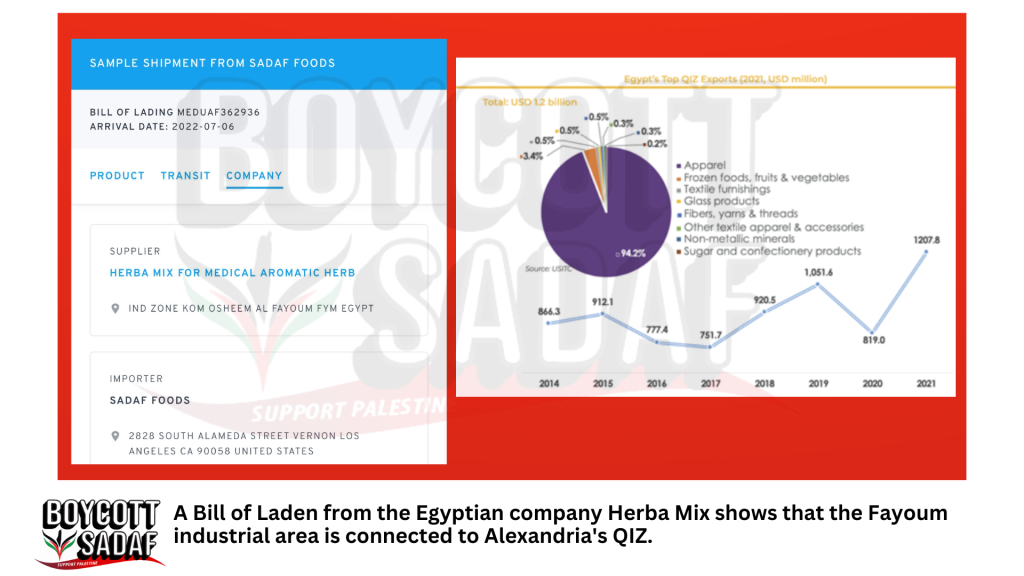
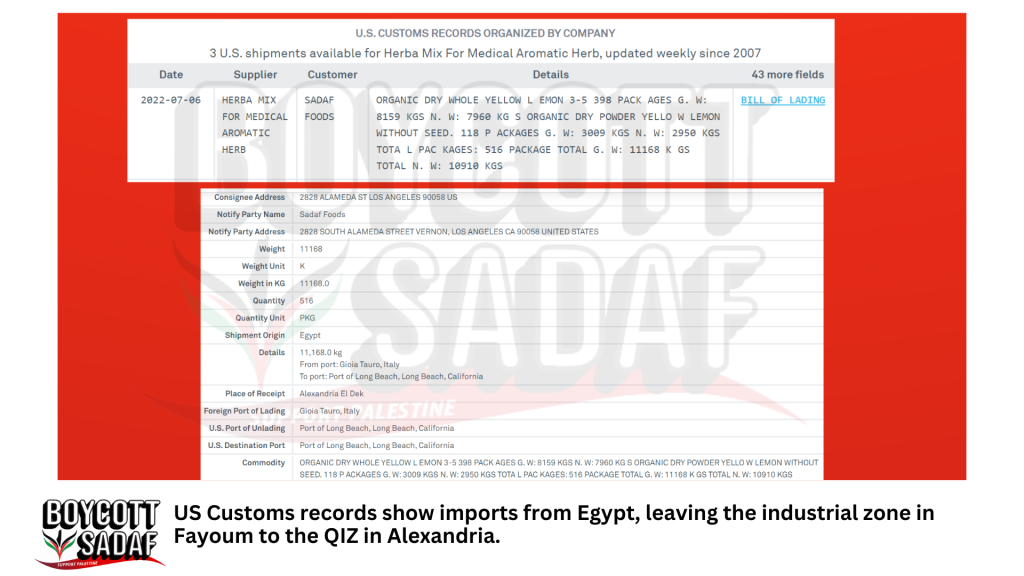
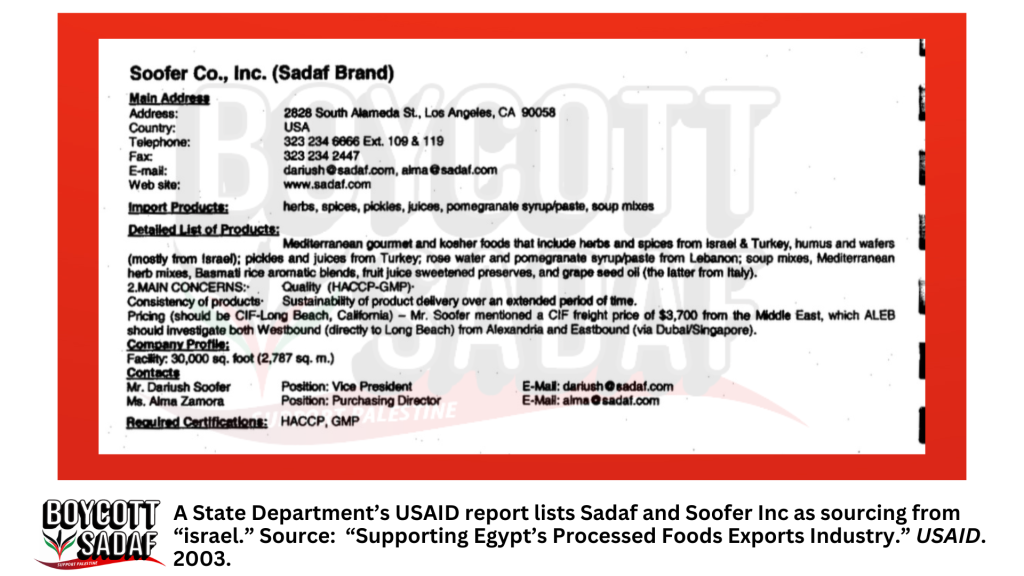
By using both Palestine and “israel” barcodes, Sadaf clearly endorses a two-state solution of land theft and colonization. Its noted relationship to USAID as an export/importer to support Egyptian agriculture through QIZs also backs the likelihood that Sadaf is on board with a U.S.-backed normalization plan. This relationship to the Organic Herba Mix facility in Fayoum’s newer industrial zone – which is connected to Alexandria QIZs – may be evidence that Sadaf is invested in supporting normalization efforts while also benefiting through its participation. And it benefits this Egyptian company by being an easy outlet for trade.

QIZs do a great job of covering up the supply chain and sources for goods. In addition, Sadaf’s bank, Israel Discount Bank, is specifically invested and has historical roots to the citrus-growing settlements that facilitated the Nakba. If the lemons do come from settlers in Occupied Palestine, the U.S. protects this exchange from being explicit on any trade documents. This dilutes the truth of where Sadaf sources its goods. In the case of the lemons dehydrated in Egypt, Sadaf labels them as “Processed in the U.S.” This is disingenuously untrue, but Sadaf possibly gets away with it because the lemons are processed in U.S. imperialist bases like these QIZs.
With trade incentives that benefit Sadaf, this explains why it is able to sell in local markets for cheaper than other companies.
Sadaf is directly implicated with IOF & US military
Sadaf is a family-run operation, and both the company and its leadership have expressed support for “israel.” They have attended events that center and glorify ethnic cleansing by the zionist entity, like the Celebrate “israel” festival that occurs annually in Los Angeles , and features businesses, military promotion, invented zionist culture, and more. In turn, the Soofer family participates in events and activities and supports institutions that constantly feature “israel” and the need to support the settler colony.
Sadaf sources 70% of its goods from “israeli” settlers
Sadaf sources the majority of its food items from Occupied Palestine, ranging from canned goods and spices to herbs and grains.
These items are labeled as coming from “israel,” Palestine, or sometimes other countries. However, these labels are intentionally misleading. Sadaf buys the raw product from the provider, which ships it from a port in Europe, usually Spain. Once it arrives in the U.S., Sadaf packages and labels it there. The bill of lading reveals that the following products were sourced from zionist settlers in Palestine. These shipping documents are signed off on by Sadaf employees who use the email addresses purchasing@sadaf.com and almaz@sadaf.com.
Palestine is famously known for its agricultural economy, which white European zionist settlers seized upon to create agricultural collectives on stolen Palestinian land as far back as the early 1900s. Sadaf directly collaborates with these collectives for its food items, while simultaneously sustaining these settler-colonial industries to fulfill its zionist agenda. As such, it has contributed to the erasure of the following villages and areas:
- Wadi al Khudeira, Nahr Akhdar, and Arab al Fuqara: Soofer Co., Inc. and Sadaf source from an “israeli”settler agricultural collective called Gat Foods, which exploits this area of Palestine. It is one of Sadaf’s three top suppliers. This collective ships its agricultural items to Spain, where Soofer and Sadaf import them into the U.S.
- Khirbet Mulabbis: The spice company Ta’am Vereach Spices, which boasts as one of the oldest ‘israeli’ spice merchants, is based in the ethnically cleansed village of Khirbet Mulabbis, what zionists label “Pitah Tikvah,” the very first white European Jewish colonial settlement on Palestinian land. The company Nuts and More, based in Los Angeles, imports spices from Ta’am Vereach Spices, and Sadaf buys from it at wholesale. This dilutes the sourcing claim for Sadaf.
- Asdoud: Sourcing its tomato paste from colonized Asdoud, Segev Foods is one of Sadaf’s top suppliers. Segev Foods also produces “israeli couscous,” and “israeli Falafel,” as well as citrus. Sadaf has over 2,000 imports on record from this zionist food production company that operates both out of Asdoud and opened an office in New York after the Oslo catastrophe in 1996.
- Kafr Qara: Using the zionist Zim logistics company, Soofer and Sadaf source their pickled items from Pri Hane. Pri Hane is based in Kafr Qara. Pri Hane uses ZIM shipping logistics, which is widely being boycotted by Palestinians and solidarity communities globally.
Sadaf coopts and appropriates Palestinian indigenous culture
Sadaf appropriates Arab and other regional cuisine and exploits our food culture for profit. Sadaf uses Arabic words and script to appear Arab and gain access to our communities, while forging our recipes and calling them “Israeli.” They normalize their zionist presence on our shelves by attempting to appear familiar and using the invented Mizrahi identity that reduces the history of Arab Jews and ties them to the zionist colony.
Sadaf is funded by zionist banks
Sadaf is a customer of Israel Discount Bank-New York (IDB-NY), which has an office for businesses with needs in “israel,” including offshore money management. It is headquartered in ethnically cleansed Yafa (what is colonially referred to as “tel aviv”). IDB-NY was founded shortly after the Nakba, with deep ties to the original citrus agricultural businesses the zionists established on stolen Palestinian land. Don Tolkovski, the son of a capitalist zionist from Poland, joined the IDB. His father was the owner of the Ha’aretz newspaper and invested heavily throughout zionist industries. Don Tolkovski was tasked with strengthening these as a leader in the bank while organizing zionist supremacist movements that advocated for the continued land theft and ethnic cleansing of Palestine.
IDB specializes in all areas of food and beverage, from settler farms to processing plants, and especially serves to connect businesses to other businesses or to the consumer.
IDB-NY boasts that it is the largest “israeli” bank operating in the U.S. And Sadaf has expressed how much it “enjoys” this bank, according to a feature article the IDB-NY did that has since been removed (see slides for proof). Early on during the Covid-19 pandemic in 2020, Sadaf received a PPP loan worth approximately $652,000 from IDB-NY. Sadaf is a U.S. company and also registered as a business and importer in the zionist colony of Israel. These funds facilitate continued business between Sadaf and the zionist colony, benefiting personnel, businesses to source from, and of course, the survival of the zionist entity.
Sadaf uses harmful materials
Sadaf has used harmful ingredients – specifically lead – in its spices, which are consumed by our community members and other buyers. In 2017, Sadaf was found to have violated Proposition 65, “The Safe Drinking Water and Toxic Enforcement Act of 1986 in California, where it is based.
Again in 2020 several violations were found and brought to the attention of the State of California across a variety of products. Since then, Sadaf has had to publish a warning on their website that their products may contain lead and cancer causing materials.
